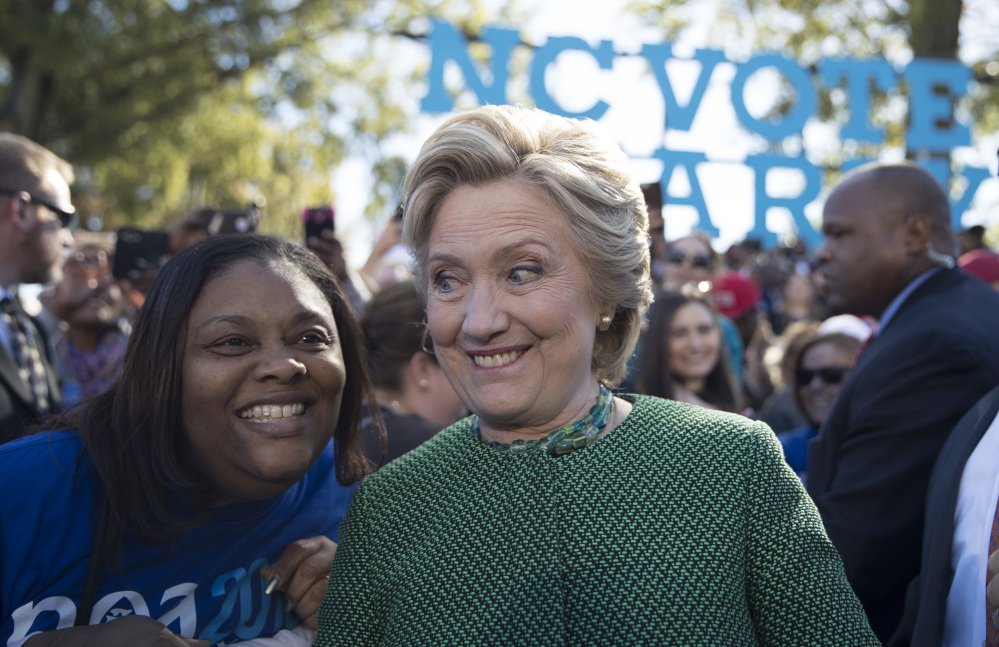DURHAM, N.C. — Newly confident and buoyant in the polls, Hillary Clinton is looking past Donald Trump while widening her mission to include helping Democrats seize the Senate and chip away at the Republican-controlled House.
Though Trump’s campaign insisted Sunday it was premature to count him out, it’s Clinton whose path to winning the White House has only grown wider in the race’s final weeks. Even longtime Republican strongholds such as Utah and Arizona suddenly appear within her reach on Nov. 8, enticing Democrats to campaign hard in territory they haven’t won for decades.
The shifting political map has freed Clinton and her well-funded campaign to spend time and money helping other Democrats in competitive races. Clinton said she didn’t “even think about responding” to Trump anymore and would instead spend the final weeks on the road “emphasizing the importance of electing Democrats down the ballot.”
“We’re running a coordinated campaign, working hard with gubernatorial, Senate and House candidates,” said Robby Mook, Clinton’s campaign manager.
And for good reason.
After a merciless two-year campaign, the next president will face the daunting task of governing a bitterly divided nation. If Clinton wins, her prospects for achieving her goals will be greatly diminished unless her victory is accompanied by major Democratic gains in Congress.
“We’ve got to do the hard and maybe most important work of healing, healing our country,” Clinton said Sunday at Union Baptist Church in Durham, North Carolina.
Campaigning in North Carolina, where Democrats hope to unseat Republican Sen. Richard Burr, Clinton’s argument appeared to rest on the hopes that voters offended by Trump would vote against Burr, too.
For Democrats, there’s another reason to try to run up the score. With Trump warning he may contest the race’s outcome if he loses, Clinton’s campaign is hoping for an overwhelming Democratic victory that would undermine any attempt by Trump to claim the election had been stolen from him.
In a rare admission of fallibility by the typically boastful Trump, his campaign acknowledged he’s trailing Clinton as Election Day nears.
“We are behind. She has some advantages,” Trump campaign manager Kellyanne Conway said. Still, she added, “We’re not giving up. We know we can win this.”
Conway laid out in granular detail Trump’s potential path to winning: victories in Florida, Iowa, North Carolina, Nevada and Ohio, to start. If Trump prevents Arizona and Georgia from falling to Democrats and adds in some combination of Colorado, Virginia, New Hampshire and Pennsylvania, he could reach the 270 electoral votes needed, Conway said.
It won’t be easy. A current Associated Press analysis of polling, demographic trends and other campaign data rates Virginia as solidly Democratic, while Colorado, New Hampshire and Pennsylvania are all leaning Democratic. Arizona, remarkably, is a toss-up.
If Clinton wins, Democrats would need a net gain of four Senate seats to retake the majority. House control would be much harder, considering Republicans currently enjoy their largest House majority since 1931. Democrats would need a 30-seat gain, a feat they haven’t accomplished in roughly four decades.
Clinton’s nascent focus on helping fellow Democrats comes with an inherent contradiction. For months, she deliberately avoided the strategy employed by other Democrats of trying to saddle all Republicans with an unpopular Trump. In August, she said Trump represented the “radical fringe,” rather than the mainstream of the Republican Party.
“We have not run this campaign as a campaign against the GOP with the big broad brush – we’ve run it against Donald Trump,” Clinton’s running mate, Tim Kaine, said in a weekend interview.
Painting Trump as beyond the typical Republican Party was a strategy intended to help Clinton win over voters who identify as Republicans but dislike Trump. Yet it’s been a major sore point for Democratic campaign groups, illustrated by an internal Democratic National Committee email in May that was hacked and later disclosed by WikiLeaks.
“They don’t want us to tie Trump to other Republicans because they think it makes him look normal,” top DNC official Luis Miranda wrote under the subject line “Problem with HFA,” an acronym for Hillary For America.
Andrea Bozek of the National Republican Senatorial Committee, the Senate Republicans’ campaign arm, said Clinton’s last-minute push to aid Democrats was insufficient to make up for her party’s shortfalls in recruiting competitive candidates this year.
“Democrats have relied on political gravity from the presidential race to carry them across the finish line,” Bozek said.
Send questions/comments to the editors.



Success. Please wait for the page to reload. If the page does not reload within 5 seconds, please refresh the page.
Enter your email and password to access comments.
Hi, to comment on stories you must . This profile is in addition to your subscription and website login.
Already have a commenting profile? .
Invalid username/password.
Please check your email to confirm and complete your registration.
Only subscribers are eligible to post comments. Please subscribe or login first for digital access. Here’s why.
Use the form below to reset your password. When you've submitted your account email, we will send an email with a reset code.